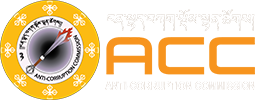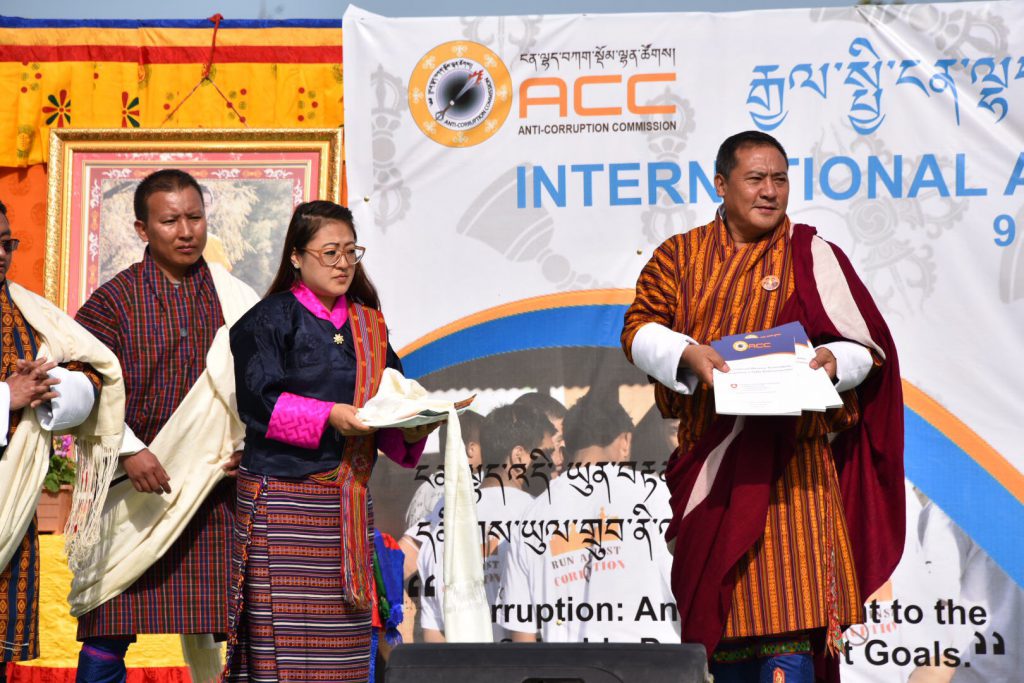Coinciding with the International Anti-Corruption Day- 9th December 2017, ACC Launched the Public Road Construction Research Report. This research is an Institutional collaboration among the Ministry of Works and Human Settlement, Ministry of Finance, Royal University of Bhutan and the Anti-Corruption Commission. The research to enhance efficiency, accountability and transparency in public road construction was carried out with financial support from Swiss Agency for Development Cooperation (SDC) and the Royal Government of Bhutan (RGoB).
There is no doubt that the Ministry of Works and Human Settlement had initiated several reforms to streamline several policies, rules and regulations, and procedures to enhance and promote quality construction in the country. However, given the important role roads play in socio-economic development of the country and the huge investment in the sector ever since the launch of planned national socio-economic development in 1961, and the vulnerability of the sector to corruption, the research was undertaken. With an overall objective to provide recommendations to improve efficiency, accountability and transparency in road construction, this research also evaluated the processes where corruption and illegality are most likely to occur in the project life cycle of road construction; delineated the causes and effects of corruption and illegal activities in road construction; and evaluated the costs of wrongdoings and corruption in road construction. For these, various qualitative and quantitative methods were adopted. The three key methods were desk research including analysis of three illustrative case studies, audit reports related to road construction and complaints related to construction sector received by ACC, conducting focus group discussions (FGD) and semi-structured interviews, and administering a survey questionnaire. Six rounds of focus group discussions and 24 interviews were conducted with the key stakeholders such as contractors, engineers, tender committee members etc. Further, a total of 1,178 contractors and public officials responded to the survey covering representative sample of all the stakeholders involved in road construction in all Dzongkhags, Thromdes and DoR Regional Offices.
This research established higher prevalence of corruption in the form of favouritism and abuse of functions although existence of bribery, abuse of privileged information, bid rigging etc. were also confirmed. Using the Structural Equation Modelling, the findings of the research established the following causes of corruption in public road construction in Bhutan:
• Poor supervision, monitoring and enforcement;
• Undue influence;
• Dishonesty;
• Unfair practices; and
• Lack of accountability.
Besides these key findings, the research also assessed the general condition of the roads and validated the issues that stunt the efficiency and effectiveness of the roads sector from making contribution proportionate to the budgetary allocation that the government accords. Some of the key issues validated are improper planning, ineffective coordination among the agencies, lack of capacity development for engineers and contractors, lack of material price index, etc.
Simulating the amount lost to wrongdoings/corruption in the road sector, as identified by Royal Audit Authority (RAA), to the GDP contribution by road sector, this research estimated an average loss of Nu. 78.14 million per year from 2010 to 2015. While the recommendations proposed in the report cannot be taken as an antidote to solve all the issues of corruption and wrongdoings that the road construction sector is grappling with, it is however, expected that the recommendations will help in minimizing the issues that this research identified. Some of the recommendations proposed are: Develop Standard Operating Procedure/guidelines for effective contract implementation, supervision and monitoring; Review technical score system; Develop and enforce Quality Assurance Plan; Adopt and implement integrity initiatives; Implement Model Guidelines on Managing Conflicts of Interest in the Public Sector 2017; Implement The Gift Rules 2017; Provide training on ethics and integrity to engineers and contractors; Develop guidelines for deviation; Adopt and enforce The Debarment Rules; Develop and enforce contractors’ accountability framework; Develop capacity of engineers and contractors; Conduct awareness on Procurement Rules and Regulations (Procuring and Law Enforcement Agencies etc. Click Here for details

